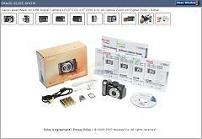|
Whether you are researching a potential product or trying to resolve a problem there are now a multitude of sources you can use.
Manufacturer websites
If you’re looking for a new PC, probably the best place to start is the manufacturer's website. The quality of the website is a good indication of the quality of the product and the level of support you are likely to receive. Some will be very open about their products, possibly even allowing you to download and read the manual before purchase. This can be very useful. For example you might find that the battery life quoted in the manual is less than the salesman states or that the stated function on the box is actually an optional extra.
 Retailer websites Retailer websites
One of the best references for consumer opinion of computer and electronic products is US-based Newegg. As well as providing excellent product data aimed at consumers, there are also large numbers of usually constructive reviews. Ebuyer is a similar UK-based retailer with customer comments, who provide good service too. Scan are another well-respected retailer who provide good product data.
 Hardware test websites Hardware test websites
If you’re interested in building your own PC or finding out more detailed information about PC components then check out these websites, Tom’s hardware guide and AnandTech. Too techie for beginners, and not as independent as they once were, sites such as these are slowly evolving to support a wider audience.
Forums
Most new electronic products have a discussion forum somewhere on the internet. With contributions from owners and prospective owners these can be useful for building up a picture about a product. However, some contributors can be very biased either for or against a particular company or product. Some companies, notably Microsoft, Sony and Apple, provoke such a reaction from fans and detractors alike. They either love them or loath them.
Looking for a new Broadband supplier?
If you are still using a dial-up connection or are unhappy with your current supplier then check out this website, thinkbroadband. It won’t make good reading if you’re with one of the major ISPs, however. Typically, they’re all rated poorly. In fact it’s very difficult to recommend anyone at this time as they’re all pretty poor really.
Telephone call centres
Before you contact a PC or ISP call centre, make sure you have backed up all your data, if you can. Staff on call centres are under pressure to close calls within a set time period, typically 45 minutes or so. So if your PC still has a problem after 30 minutes they may persuade you to use your system recovery disk. A system recovery will return your PC to its original working state and the call centre contact can successfully close the call, keeping their supervisor happy. You, however, may not be a happy bunny when you realise you’ve lost all of your data, settings and software downloads, probably unnecessarily. A system recovery is a last resort and should only be used in the most extreme cases. Always ask for another opinion before opting for this measure.
Magazines
Magazines are funded by sales and advertising. So, it takes a brave editor to upset a big advertiser, and their own publisher, by publicly berating one of the advertiser’s products. Computer and console games magazines are plagued by this, but more mainstream computer magazines are generally a pretty fair bunch, PC Pro excepted. Gadget magazines, however, are biased towards the 'new and shiny' and frequently overlook the simple fact that most new gadgets are overpriced and underdeveloped.
Reviews
Just a word of warning about any review. Manufacturers (of almost any product) always make sure that items submitted for review are of the highest quality, which may not always be representative of the final consumer product. Occasionally, a magazine or website will give a glowing review to a particular piece of hardware only for readers to start complaining that their version of that product just isn't as good as the one reviewed. A well known LCD monitor manufacturer recently had this problem with a monitor produced in different plants - there were complaints that those produced in one plant were markedly inferior to those produced in another. Reviewers were only sent examples from the good plant.
Friends or relatives who work in IT - Warning!
Having spent more than 20 years working in IT departments, here is some of my advice that you should know before accepting advice from a friend or relative who works in IT.
- The IT industry is huge, far bigger than most people realise, covering many areas and fields of expertise. As a result, few IT professionals are in technical roles and only a very few of those actually work supporting Windows based PCs. Most don’t understand even the basics, frequently confusing Memory with Storage or calling their Base Unit a “Hard Drive”.
- A little knowledge is dangerous, especially when dealing with computer fixes and repairs. Things can quickly go from bad to worse. There are usually no quick fixes to many PC problems and most cannot be solved with a single command or program. People offering advice may not fully understand all the issues, nor may they be willing to invest hours of their time to help, especially when their first suggestion doesn’t solve the problem.
|